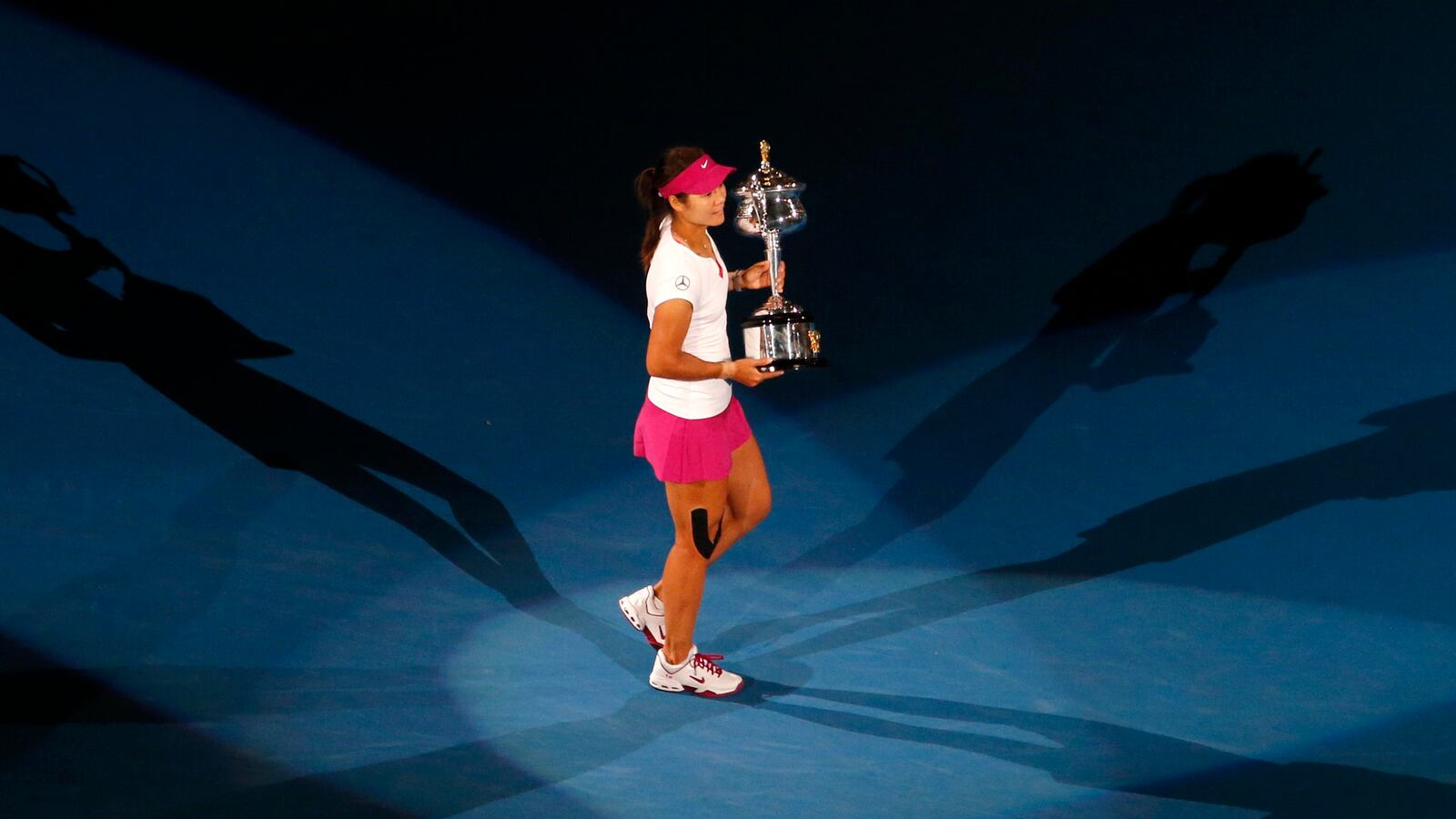If there is one video to watch of Li Na, it’s her 2014 Australian Open winner’s speech, which is akin to her patented backhand: the best of the best.
Thanking her support team, Li, a Grand Slam winner for the second time in her career, does her best comedy routine in front of a stand-up microphone on the court’s makeshift stage in Melbourne. Tennis dignitary Chris Evert stands behind her, forced into rapturous laughter along with 14,000 others inside the arena.
“Max, [my] agent, make me rich,” she says, the crowd roaring. “So, thank you.”
Then, in acknowledging her husband, Jiang Shan: “You are a nice guy,” she says. “And, also you’re so lucky, you find me.”
Tennis, too, had been lucky to find Li Na, a Chinese megastar who had won two Grand Slams and brought the sport soaring success throughout Asia. Late Thursday night, she retired from tennis at the age of 32, arguably at the top of her game, but clearly exhausted from a career that stretched nearly two decades.
“After four knee surgeries and hundreds of shots injected into my knee weekly to alleviate swelling and pain, my body is begging me to stop the pounding,” Li wrote in a Facebook post on her fan page, her fourth surgery coming in July. “As hard as it’s been to come to this decision, I am at peace with it. I have no regrets. … Not many people believed in my talent and my abilities, yet I found a way to persevere, to prove them (and sometimes myself!) wrong.”
The decision to end her career has no doubt been a hard one for Li, who won nine career titles (including the French Open in 2011 and the Australian Open this year), collected $16 million in prize money, reached a career high ranking of No. 2 in the world, became the first Asian tennis player to win a Grand Slam in singles, and has over 23 million fans on Weibo, the Chinese social media network (compared to Serena Williams’ 4.3 million followers on Twitter).
The Women’s Tennis Association (WTA) is now left wondering: where does it go in Asia? In 2014, 12 tournaments are being held on the continent, including the tour’s cornerstone event, the WTA Finals in Singapore, which begins a five-year stay in that city next month. Twenty years ago, eight WTA events were played on the continent, including just one in China.
“In 2011, there were two WTA events in China, in 2014 there are eight. I’ve never seen such a sudden shift [in that time frame] in my years working in the sport,” said Anne Worcester, tournament director of the Connecticut Open in New Haven and a former CEO of the WTA in the mid 1990s. “Li Na has been a really important trailblazer in the Asian market, not just for women’s tennis but for women’s sports in general. She’s a global celebrity.”
The celebrity of Li is hard to fathom in terms that American fans—tennis savvy or not—can fully comprehend. In July, Nike announced it was naming one of its new buildings after her in Shanghai. That came just two months after TIME put her on its cover for a second time in two years. And Forbes listed her at No. 85 in its top 100 celebrity earners this year, noting deals with Rolex, Samsung, and “multiple Chinese companies.”
Women’s tennis has been searching for lasting global stars for a good part of a decade now. Yes, Maria Sharapova and the Williams sisters remain synonymous with the sport, but they had their breakthroughs over 10 years ago. Li offered not only global billing with a personality to boot, but an entire new platform of fans—billions of them.
“In addition to her amazing tennis abilities and her warm and humorous personality, she is a pioneer who opened doors to tennis for hundreds of millions of people throughout China and Asia,” Stacey Allaster, the current WTA CEO, said in a statement. “It’s hard to be a household name in a nation with 1.4 billion people, but that’s what Li Na is.”
Oftentimes, however, that national pressure weighed heavily on Li, who became the face of Chinese (and Asian) tennis after winning the French Open in 2011. In a system where players are required to use national coaches and give a portion of their prize money back to the tennis federation, Li broke the mold by taking on outside coaches and keeping all her earnings. She could be a combative personality at times.
“Do I need to get on my knees and kowtow to them?” She snapped at Chinese reporters after a loss at the French Open last year, when asked what she had to say to the people at home. “Apologize to them?”
Li was revered, however, for expressing herself in public and—as Liu Renjie, a sports journalist at Chinese news outlet Sina.com explains—giving Western nations a new view of China.
“Most of the fans gave their full understanding to Li's retirement decision,” Liu wrote in an email. “Some [fans] had mixed emotions and felt very shocked at the news. They wanted to cry about it. ”
Liu continued: “I don't think there will be someone who can replace her in a very long time. Not only for tennis, but also for any sports in China. Fans looked up to her as a special national hero who had the courage to express her true feelings. I'm sure there will be a huge down fall in the next two to three years for women's tennis in China. It’s very painful for us to even think about it.”
As Liu and Worcester note, Li brought tennis to an entire new population of fans, including Asians living around the globe. Li said after the Australian Open final in 2013 that there were so many Chinese flags in the stadium she felt as though she were playing “the China Open.”
“She played [in Connecticut] in 2011 and the turnout of Asian fans is something I’ve never seen in New Haven,” Worcester recalled. “It was a glimpse into her global reach. While there will be always be an emphasis on the next great star, Li Na has already opened the door. She’s a trailblazer.”
And here’s something: a trailblazer with adoring fans inside the sport, as well. Ask any tennis journalist (myself included) or public relations representative if they have a good Li Na story and they do. They have several. She looks you in the eye, is quick to laugh when you want her to, and takes tough questions seriously. She hilariously explains Chinese proverbs when someone sneezes off-camera during interviews. She’s a warm, witty, big-hearted human being, which isn’t easy to find with world-class athletes.
“Don’t be too hard on me,” she joked to me in Sydney in 2012 when we began a one-on-one interview. “I’m tired from tennis all day.”
The tennis is what she did best, though.
“Li Na will leave a lasting legacy for China, Asia, and the WTA,” added Pam Shriver, a former world No. 1 in doubles who is now an ESPN commentator. “Her backhand, her humor, her two major singles titles will be the things I remember about her. Her speech this year after winning the Australian Open will go down in my memory forever.”
But as executives in offices in St. Petersburg (where the WTA is based) and around the globe try and figure out how to keep women’s tennis relevant in the Asian market without its biggest star playing anymore, the sport mourns the player – and the personality – that Li takes away from the game.
“One of the funniest players on tour,” wrote Caroline Wozniacki, the US Open finalist, on Instagram, attached to a photo of herself and Li at Wimbledon.
Again, in Melbourne, she displayed her comedic genius in 2011, when, after advancing to a major final for the first time, she blamed her poor play at the start of the match on her husband’s snoring.
“I didn’t sleep well because he was like this,” Li told the reporter on court, snorting into the microphone. “I woke up every hour.”
Then, asked what motivated her to come back in the match, she deadpans, even in broken English, with perfection: “Prize money, no?”
“While my journey hasn’t been easy, it has been rewarding,” Li continued in her retirement letter on Facebook Thursday. “I’ve seen change happening in front of my eyes, young girls picking up tennis rackets, setting goals, following their hearts and believing in themselves. I hope that I’ve had the opportunity to inspire young women all over China to believe in themselves, to set their goals high and pursue them with vengeance and self-belief.”
“The task of finally making a decision to hang up my racquet felt a lot more difficult than winning seven matches in a row in the Australian heat. I look forward to slowing down and living my life at a new, slower, relaxed pace.”






